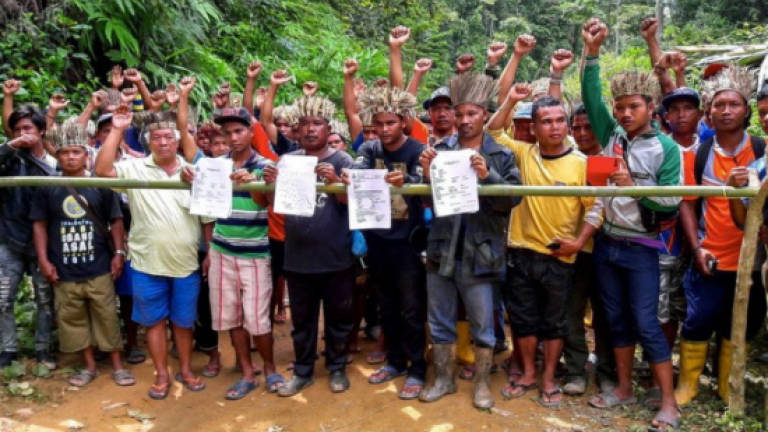Egalitaria - Rights of the natives

A VIDEO went viral at the end of November on social media, portraying the Temiar Orang Asli community singing Negaraku as the blockade they had set up to protest logging at a forest reserve in Gua Musang in September was destroyed. Several orang asli villagers were also detained as a result of the incident.
This particular action was ordered by the Kelantan State Forestry Department, while a representative of the Kelantan state government stated that all logging activities in Kelantan since 1978 had complied with the law and urged all parties to comply with set regulations.
The orang asli in Malaysia despite being natives and therefore technically part of the bumiputra community have, unfortunately, not quite benefited from the country's affirmative action policies. A United Nations Development Programme (UNDP) 2014 report revealed that almost 34% of orang asli households live in poverty, this despite official country figures that say 0.6% of the population live below the national poverty line. Why the disenfranchised community? Has the government not paid enough attention to their woes?
The government has indeed set up a body looking into orang asli affairs, the Department of Orang Asli Development (or Jabatan Kemajuan Orang Asli), whose mission is to "implement inclusive development to improve the socioeconomic status and quality of life while advancing and upholding the excellent heritage of the orang asli community", but one does wonder to what extent the heritage of the orang asli is being preserved, really.
Many of the problems faced centre upon the lack of recognition of their land rights. This is a crucial point. Colin Nicholas from the Centre of Orang Asli Concerns (COAC) who has long championed their cause, said in a speech that "In the traditional context of their customary land, orang asli would have enjoyed full autonomy over their traditional lands and territories. These are lands held by them by custom and history, and which our courts have recognised as being native title lands under common law".
There is a lot more to unpack when discussing native customary land rights, but suffice to say that the property rights of native peoples are now being slowly but surely recognised around the world as legitimate. The problem, however, is that because these were only customarily recognised in the past, these lands need to be formally gazetted in order to be legally recognised.
The Federal Constitution places land as a state matter, which means technically it is the state governments' responsibility to gazette land as orang asli land. In 2009, when the new Selangor state government set up an Orang Asli Land Taskforce, the orang asli community (mainly Temuan) were overwhelmed and thankful that their rights were being recognised for the first time after so long. The taskforce, headed by an orang asli, was to conduct research to delineate the proper borders of orang asli native customary land, so the state could gazette them and land titles could finally be awarded to them.
While states have primary jurisdiction over land matters, it is not right to place the entire burden on them and absolve the role of the federal government entirely. Indeed, Article 76(4) of the constitution does allow for the Federal Government to make laws pertaining to "tenure, acquisition, registration, transfer of land and other rights and interests in land", so they could very well protect the recognised customary lands of the orang asli.
The protection of ethnic minorities anywhere in the world is an unquestionable right. Already in 1992 the United Nations member states unanimously adopted the United Nations Declaration on the Rights of Persons Belonging to National or Ethnic, Religious and Linguistic Minorities, which basically guides countries in their efforts to ensure minorities are not discriminated against.
But Will Kymlicka in his paper "Liberal Multiculturalism: Western Models, Global Trends, and Asian Debates" argues that Asian countries have been surprisingly absent from this global debate on minority rights, partly because they had little role in formulating these international standards in the first place.
According to him, the indigenous of many countries in the region suffer from state policies to "swamp their land with settlers". They are also pressured by the state and its various instruments to assimilate into a homogenous society. The paper in fact cited incidents of indigenous communities in Malaysia being pressured to convert into Islam. Malaysia's National Culture Policy introduced in 1970 also comes to mind, which emphasised the assimilation of non-Malays into Malay culture. Its website states, "… The culture of the indigenous people from this region, which, in a wider or narrower sense, refers to the Malay culture, forms the basis of the National Culture Policy".
Multiethnic and multicultural countries like Malaysia will continue to face challenges in negotiating for rights in public space, especially so for an ethnic minority with such minimal negotiating rights as the orang asli community. But the key is to ensure all citizens are free to exercise their individual liberty; in an ideal world, rights and protections should not be the state's prerogative to give away in the first place. Individual liberty ought to be accorded to each person regardless of ethnicity, religion or political affiliation.
As we end the year with festivities, it is hoped that the rights and privileges we possess are not taken for granted. The liberty we enjoy should also be restored to those who have lived on these lands for hundreds of years before us. The Malaysian government, having endorsed the United Nations Declaration on the Rights of Indigenous Peoples, needs to collaborate closely with other state governments to fully recognise what it signed into; that our orang asli have the right to the full enjoyment of all human rights and fundamental freedoms, that they are free and equal to all others in this country, and finally, that they have the right to the lands they have traditionally owned.
Comments: letters@thesundaily.com